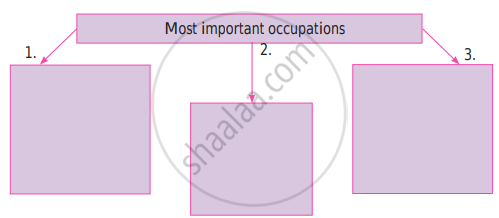Advertisements
Advertisements
Question
Read the polite request/suggestion and complete the gaps in the responses. Make sure they are polite and not repeated.
| Shall we plan a class-picnic? | Agree (1) _____________ Refuse (2) ____________ |
Solution
Accept (1) Yes, let's!
Refuse (2) Not now: I'm going to my native place or a month.
APPEARS IN
RELATED QUESTIONS
Read the polite request/suggestion and complete the gaps in the responses. Make sure they are polite and not repeated.
| May I know the exact time? | Accept (1) ____________ Refuse (2) ____________ |
Read the polite request/suggestion and complete the gaps in the responses. Make sure they are polite and not repeated.
| Do you need help? | Accept (1) ___________ Refuse (2) ___________ |
Read the story and answer whether the following statement is true or false.
The hermit spoke usually to everyone.
Read the story and answer whether the following statement is true or false.
The King received all answers from the hermit.
The character traits of the king and hermit are mixed up. Sort them out in the right box.
| feeble | helpful | enlightened |
| impatient | eager to succeed | wise |
| patient | convincing |
| KING | HERMIT |
|
_______________ _______________ _______________ _______________ |
_______________ _______________ _______________ _______________ |
Complete the Tree diagram associated with the happenings in the story.

Answer the following question.
Though the hermit did not say anything to the king for some time, he did not ignore the king or treat him rudely in any way. Do you agree? What evidence of his politeness can you point out? What shows that he listened and responded to the king’s words?
Answer the following question.
The hermit ‘spoke only to common people’; so the king ‘put on simple clothes’. Do you think the king hoped to be mistaken for a common man or was he just showing that he was a humble person? What shows that the hermit knew him to be the king?
Answer the following question.
Did the king behave as an ordinary person, rather than as a ruler, at the hermit’s hut? What shows it? Did he also act as a good, kind person? When did he do so?
Read the following passage and do the activities:
(A1) Relate the following actions with the king and the hermit: (2)
| digging | learning things | breathe heavily | asking questions |
| King | Hermit |
| 1.______ | 1.______ |
| 2.______ | 2.______ |
|
When the king arrived, the hermit was digging the ground in front of his hut. He greeted the king but went on digging. The hermit was frail and weak, and each time he struck the ground with the spade and turned over a little earth, he breathed heavily. The king went up to him and said, “I have come to you, wise hermit, to ask you to answer three questions - How can I learn to do the right thing at the right time? Who are the people I most need, and to whom should I, therefore, pay most attention? And what affairs are the most important and need my first attention?” The hermit listened to the king but said nothing. He just spat on his hand and resumed digging. The king watched in silence for a while. Then, feeling sorry for the hermit, he said, “You are tired, let me take the spade and work awhile for you.” The hermit silently handed over the spade and sat down on the ground. When he had dug two beds, the king stopped and repeated his questions. |
(A2) State whether you agree/disagree with the following statements: (2)
- The hermit was strong and agile.
- The king came to the hermit to ask three questions.
- The hermit handed over the spade and sat down.
- The king wasn’t feeling sorry for the hermit.
(A3) Solve the cross word puzzle using words from the passage referring to the clues are given: (2)

| Down | Across |
| (1) Restart/Start again | (3) A tool for digging |
| (2) Sage |
(4) Intelligent |
(A4) Do as Directed: (2)
- When the king arrived the hermit was digging the ground.
(Name and identify the subordinate clause.) - The hermit listened to the king but said nothing.
(Rewrite the sentence and begin it with “Though …...)
(A5) Whom do you consider your guide when you are in difficulty? Why? (2)
